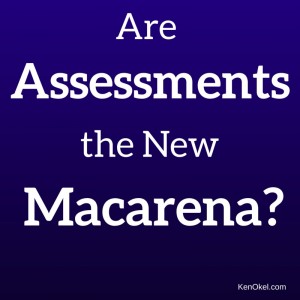 As the popularity of assessments continue to grow in the business world, I believe that for many, these tools will become this decade’s equivalent of the Macarena. Popular examples of assessments include The Myers?Briggs Type Indicator, DiSC, and the SWOT Analysis.
As the popularity of assessments continue to grow in the business world, I believe that for many, these tools will become this decade’s equivalent of the Macarena. Popular examples of assessments include The Myers?Briggs Type Indicator, DiSC, and the SWOT Analysis.
A Google search for “business assessment tools,” produces more than 480,000,000 results.
How do these tools intersect with the Macarena?
The Macarena was more than just a popular song and dance. It was a global phenomenon that set records and even played a prominent role in the 1996 Presidential election.
But for all its popularity, it was just a fad. Perhaps, it could be considered one generation’s version of the pet rock novelty gift.
This is not a criticism of the assessments, as they can be very useful tools. But the assessments are let down by two common workplace problems: A lack of followup and the realities of a work environment.
Many leaders are sold on the benefits of identifying worker strengths, weaknesses, and untapped skills. They’re happy to have their employees tested. But then, nothing happens.
In some cases, the leader is unwilling to devote further time and resources to followup training. In others, the leader doesn’t even know that more training is available and has now moved on to the next shiny object.
From taking the Myers-Briggs test, I know that out of the 16 possible classifications, I am an ENFP. In broad strokes, these kinds of people tend to be talkative, have good people skills, and do best with projects that excite them. This is great to know but then we hit the Macarena wall. What’s next? The options can be limited.
I imagine that if Hell exists, my version of it will likely feature a lot of solo work on spreadsheets. If I’m in a job where I have to do this kind of task, then I’m out of luck.
“Find a better job,” some might say. While this argument makes sense at a certain level, most jobs include a variety of tasks that feature our strengths and weaknesses. It’s rare that you have the perfect match.
The assessment has revealed a problem that you can’t fix without making major changes to someone’s career trajectory or an organization’s structure.
For those businesses that use assessments as a screening tool for hiring, a danger can be that you end up with a lot of the same types of people. I’ve written about the dangers of sameness and how growth often comes from change.
There’s nothing wrong with the Macarena. But sometimes a fun song is just a song. The knowledge provided by assessments may sound like sweet music at first but without a goal or a clearly defined next step, they may leave your organization out of tune.






